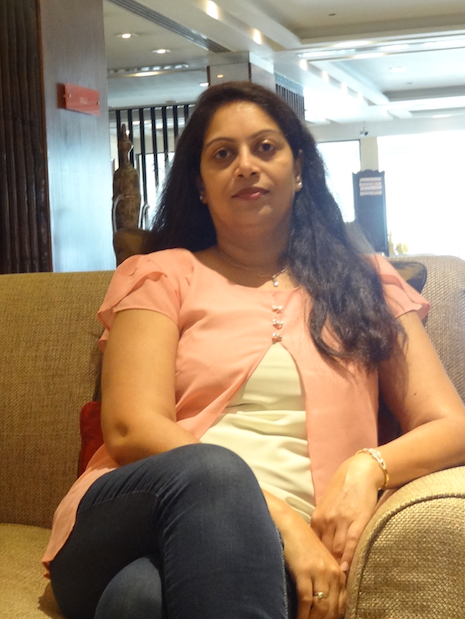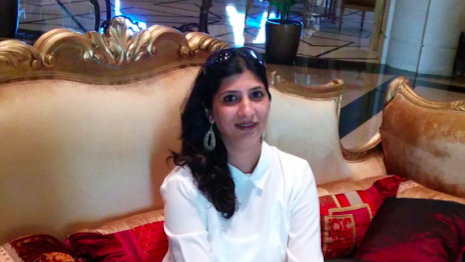By Sheetal Jain and Sita Mishra
Have you ever thought why own something that you only use occasionally or why buy an expensive product whose appeal may not last? Definitely yes. This thinking of consumers is influencing their consumption behavior.
Today’s consumers are increasingly searching for maximum value and seeking to redefine what is imperative to them. They are guided by sustainability, frugality, shared economy and wellbeing.
Not just repackaging
This concept of “New Consumerism” began a decade ago during the global financial recession and continued after that.
The circular economy is one of the several trends of New Consumerism that has made an impact across various industries. The luxury fashion industry is currently going through a phenomenal change in its landscape and is influenced by the circular economy.
Consumers’ beliefs, attitudes and consumption patterns are changing, with increasing numbers of consumers looking for sustainable products.
There has been a sizable shift in the primacy of what consumers actually value from ownership to shared economy, from possessions to experiences and conspicuous consumption to conscientious consumption and from self-orientation to sustainable orientation. They are looking for value beyond the product itself through investment in health and wellbeing. They want to feel good and not guilty while purchasing a certain luxury brand.
With the rising concern about social and environmental sustainability among opulent consumers, especially Generation Y, “green is the new black.”
In early times, the yearning of buying to impress others was considered the principal motive for acquiring luxury brands.
However, lately with the consumers’ move towards new priorities, luxury brands are working towards redefining their business models with the focus on reducing social and environmental problems through the use of sustainable technologies. They are using environment-friendly raw materials, such as organic cotton and natural dyes – for instance, the leather of a Dior handbag is attained from Italian bio farms.
Many organizations are also using recyclable packaging to ensure circular luxury processes.
Luxury fashion retailers including Gucci, Prada and Armani are responding to the rising consumer demand for making the value chain transparent and sustainable.
3Rs
The circular economy in luxury is a concept of reviving the essence of luxury with its long-established emphasis on rarity, reflective buying, restoration, longevity, endurance, hand-craftsmanship and consideration for people and planet.
Luxury brands are making serious efforts to move from the traditional linear economic model (take-make-dispose) to the circular economy through embedding the 3R principle (reduce, reuse and recycle) into the production and consumption process.
The fashion industry heavily influences the environment. It taps vast amounts of water through all the processing operations, uses 25 percent of global chemicals, contributes towards unloading polluting chemicals and industrial waste into the world.
The Danish Fashion Institute (DFI) has pointed out fashion as the second-most polluting economic sector after oil business.
Considering the gravity of the situation, the luxury business is progressing towards circularity as luxury consumers seek superior quality products that provide no harm to the environment.
For example, Prada is using a variety of biodegradable natural fibers in place of polyester. Stella McCartney uses no leather in its luxury collection. Seventy percent of the brand’s products are handmade, recyclable and reusable.
The circular economy is an appropriate response to face the issue of environmental pollution, because it is a system designed to create new wealth without downsizing the intrinsic quality of the product.
Many players in the luxury business have realized the importance of sustainability and thus are remodeling their conventional businesses by incorporating concepts of reuse, share, rent or recycle that are the essence of the circular economy.
Model turns
For a category that is still in its nascent stage, there are quite a few business models.
One such online platform running successfully in India since 2015 is Flyrobe.com that rents designer ethnic and Western apparel.
Another popular online platform is Swishlist.in. Pre-owned clothes are solution to a growing section of fashion-conscious consumers.
The clientele of such companies not only includes consumers who cannot afford such expensive clothes, but also those who are driven by the need of not repeating their outfits or people who rent for the love of fashion.
There is cultural shift in the consumption of luxury fashion. Consumers are open to wearing hand-me-downs, even if not within the family. People are not interested in spending heavily on one-time usage of such products, and there is aspiration to wear luxury clothes.
There has been increased emphasis on reusability by focusing on functionality over ownership, which leads to the growing trend towards pre-owned luxury goods.
Consumers of pre-owned luxury fashion are more content because they get to uphold their self-respect by secrecy of consumption than declaring their affinity for cheaper clothes.
They are working on the principle of the circular economy to generate the restorative economic model and create timeless luxury items that are inherited from one generation to the next.
THE CIRCULAR ECONOMY has also inspired these brands to follow the concept of reduce through production in smaller batch sizes with slow production cycles.
Luxury conglomerates such as LVMH and Kering are shortening production cycles across brands.
Though luxury and the circular economy appear to be antithetical to each other, luxury brands are making efforts to reposition themselves as the caretaker of Mother Earth to establish a positive brand image with new luxury buyers.
 Sita Mishra is associate professor of marketing at the Institute of Management Technology, Ghaziabad, Uttar Pradesh, India
Sita Mishra is associate professor of marketing at the Institute of Management Technology, Ghaziabad, Uttar Pradesh, India
Dr. Sheetal Jain is founder/CEO of Luxe Analytics, Delhi, India. Reach her at [email protected].
Sita Mishra is associate professor of marketing at the Institute of Management Technology, Ghaziabad, Uttar Pradesh, India. Reach her at [email protected].
{"ct":"FjGV42X2Esy67CKAXB0OqnS0Kmp49z6yC\/CSHSTh0QZVpET42BPQqhNCRxJAdt0+CKp6ykc3tNjbSz+4w8ePlCQRj6k4TUQkgsJt71Ng\/kxowOEszj6Www53DTWjjA\/UPTFegofOlFOCwIBYMb7h+2XvTTFznulEmfzoQh3qnA2ebYwd8rlmWRdl\/2DUzDaG7WvMMu8ksxc4ENEQiTN0JIVonsRtJFTPSVM8Xi+5aOZCkbwyPIWy\/pgtQNwTR3fCGuoOQD\/KhwwvTPnaEi3k51qEqpptzGo4BlWLQ7T91H8+CaTfMDig96ixX2f5TeRrT5+xDCJc3r3YTBLoCDsE5EWWc+qbtpEon67yG9Qnwsma4vpXbNQJ780GpjLwKZ+YaCfiuBJp9gNLOReMVDb0y2ewKwpRDZ21dFxoVv7RyZhsF\/zUWZaALut1ijrc48KWUCRddE4tBklcpOfZ0oDT3WTJJYWE0N9jOTkEAQTQ9+R2f490e4rwJ8qL0RbiwrdD14u5Xnfa8hldxVHqLRhAb1QT5LWZPIPufihjnrzO2U9pVF1OmLDFU0PELe2emEz4hUCElb+d3i7\/a6A8t4kmWTRBfU1JN5og1Iw3TUubq3IF7ib6gJHdofG24fc1y7vj1LV50Q3oe9m6aMjAZycdDSuqFYwVji50nQuIIMVA13oy0bwwjImA1SsOrgEHLRRXZWwrN4k5GR9CCxl5yGv3O+\/O0pbO78+Q8DGCbC1RwZrj04J3hGsRMNDm3rjJHvITUtbabU1flfxjC\/9sJ6SsNcKYzmrefLlRNz0W444s3pyenOpEWZR6+sb0botJFeQvws6lieBnFq7o4PzvjMBTXifYMEtuci8yalS5bNlHhwf5Swon8gO5eMFLSlBSWd6JtjqtOZ9IPnc3mYAr3gbsCrl+cnUNCu7OSIG+F8hzKlm0eDBD4UirIY+\/z6cc5jESJCQtfQL7sK7fULVaquZKPoXs174P2jDBFXPRe0J84aew5dI8CT7o+lL4x\/f\/P1wjB4WI\/6S4Bxz0apMRj669ABM3NXwpTZwexy7ooAq\/BsY6NrsLnbgSfJ2L2hSjVR7\/0iJl7hmtnGbcnU8sYnIZC8kJY8heR\/fWuebEiWxqUEcIul3TVMCTWJhWzJrtjBmqAqnZ+5wPoz9pKhViKalLZO60e7Fjmtx3uiAD1ZDnnXPXfxwvTh3OddkJ1nUET7D4nprGsLjZcIJ5fDy6M0Xt6Ml+w2nasYJSEUuSiiIxQ5hjd9pckZNLlvwqjGpiXiHem7t1AMe91JKUUCZ5hCNcu\/hLUObzIDvxUFTRdox1tibIfYR22Z0l2hNt1C6x5joq0JxSDvKxmS98Nu\/6BeVWpdzCAMD173OjYCBCqactGgnIa9B0fQEVk1D\/DNz4ISFPkK\/8Bs7B1l9zOcUJZCx\/q7Rn6yZNZnL7B+4PzTdIs0X+u3sXlsssdrMf+zKhngzwf1uLNZ6UkOtuZgW9x5dWTmBoXWDzMO2ICBnlkR+z4vPMUR4tHROQXUhxGSR9c28JBazOeDRKuBbm9Ldgm\/0z0aomotBRRPcIUWCET+SXbp8AKJ+wDwOVd8HTYA0EUeYVZEOFWkvtbPcmrC7rgOp2KC2Os5rLm8h9SXp70A1crIfc+eywe+lRxdTDDXVh8TbFsUrzXos2mjG3o18+1PLeKwHG6idM1uJsTaJtdZ\/CLnivrvi1eiqZxvliq92DLWm46aGmC6GhqIdtd7boe\/WglSziTFST4ssNu7Fjjhp9xfH7D4JG\/V7\/uVOxGuJKs7K0HFPS816hUWFDzXixD1eRHy8qlZ+r3ru3VorBCUz1gu98yY6oe0CbawFljLfBBj5VOuSei7PzRAoNijUTbn2ESTeogha2mKGNx1Y1eF2Xo9YpCMLYeTCt+TF+h6FWngacqKzU8iEYQRneeAsYuUIdR3A7frUBZBPIByC91oy5koc\/fj1UPcLJSe92lcpRFtD+Eq9bRMLIY4yL8Dm7JXSJQEKf3fwJxY7V1JVjuGzwteSkPEHqvU2FXsANcnkOSbsfoUsAb3kqZcuCelJxnFwCN9svnHd60ECZd0Vruo8ropDJUjFjyTACG5k+X8cK8QxNM7LO\/KQUvcbIoovk6O0LjwSNzAFBJTvfv4kTrzzW+m2nBiK2U72xL+cIwvdjDBame6QL0cN9lm\/7XEWkaNqfqjJuQ6oL2xryt6pU77xJqcDvBjH0L0e1yon3QlXod59OMEfp6Y0EAJiQg\/opvpaUbG4YCT2hWe\/QTk4lGjiGOqc9GyUbevYsx0BaiRV+bQFsCh8scP9SEfPox4ypuRkxVBsh+g6\/aM3wDsXbAaf3Y3jrBoGc1a1+OHOrZQ1SsWAZ7R41envRJo7Vjk34w5+UB8F0bdm+Q8ARNoA+I+Q\/MUHFjvahiONTtxIY9jgueV3c+hmeStx3ZmU\/dypc4Tlh8gS6OK77flPJugOd\/KTq19MjYN3EI7dAMIy\/9s4fteCtuK3DTkdAIrUve5N3v7kZt798ouKxLcWFYILQU9DBeQUzs0goM1xRTaQSrBTUncS6IhztLKvxsH5DB0GXj0XCZWsbJMAdn1\/kdSIpjQns\/GR0mJMO3pyKQ+rZVwCf5RA67MoC+wb+vr56XtFR5T+WylJ6fnhWw+BLpTkW5r7R3b4su27ZrqlTukwTGdKB5TvgpwLMKNkMXe6fSb4tBm+WRVMWI08a5ZzHCSR3RpTwVPO+ml9O8rAAvaKCBtk6Z0UPqKoDbdGADiAt6iroIUIVqmXAv4N0xTbcNiXf75p4gOpblAT4xoS14EbdtspD+X9ms+A0xy7XSrOWf0cOBNNfbU+DJs3pIQo0Vz4v4+V6Y0bjWwods1lszRr0ESrZl4TBQvvlpB7AIe48\/nKHuGBau7F59DFTMfiRRDJkxT0uV7Hd0PMB1WLi24zlBSOGn\/xTR0+MmpYpR6wWnvZB9PrcK3H2aJqhfvfMMr5vy9XWiELNZIThU49TrQzBPKe5SUuqZFMYIMueLXdzX3G6eMqRzL5VpS687x9ZOudchOWhZx8k7eU2qGKuTWEQEJYTYtn+z24AwvRDGStnj8p0kLrLehxmQWSMUCAtLAk3bR6xH89bgqBuepSeHjtpyoajYconbq5\/KJJ7bmv8JoqKnz9D\/EFl8JDCCa3Me62Z1WF06hnFXK+q35LKRlJCuQYGT8j\/Jx3IaVsIBHnvYkNpce3ZYZ6eLzNDvGVjl5qJEc6y44Qa+IjjBjqkd01T9d8pOj7lucYDZqcxuuZv5TSotcBYUuPU0Y1\/qVeeeYvQz+apl+RVfEpuRv3LZoczJ8C6812Mei6IZhbdtv7JTHciYPCWqV2kTnHyL3uyZiukaTIxxut+O\/\/SYrO5SiKHAAk6qQOCQHbz4UieYJ\/IXIw6IBElq8QQO4F+wzJhk4j+fq6EEHSrtzrTcnk7WDxr\/If80wQOioE\/UF2L5jZLULtAHt5CNjzhvrfGouAjbzBL0XUNoioishMyAiz4VNzU8JOrAQWtnvnv\/BtB8pzjOn2m8OhAN3IyVkGiM+m2IZb4j3gSN851RZx\/isKHinwgkySTyVT9BBsU66HQDQ20LFyMhfI4TD60PsUMacPkrOo4Xmmo\/cxJ9cTa2kAeG7ZnDgX2n1wBW2iTb9VPtpDBaD1i7LqNrcYAJ6pil3M5oRdeGirS\/l2EawF68GeG6SbrLIbLPSggZ2ajOBLEyI8bnmDvxO5Y3XpVPVRDo+I0gWoDXmVvt7KdeFRFtau+oCuZI8yvnHWjPUHjVnmbJbs24kR66E5HLboguuRcoUMHsBnrn+99GRiG7S32p5enn8iUtJS2PbVT+BCXoeitu1PGPwlCRIdvhqIJhuQN7JqoO8j7WATvF4Se+QcL9eSv\/WIYud7jDaq+M+NgiA6G2984xejcxI3PDAX34r5699CT0c\/nDl6Wdt574DBOPbBXhXAfZq\/UjLjMJLAn4wQYSDxV3ArJvbIOHQ9T5\/sl1AXWz32gBAOoZE1qtdAYSHBylMPZQeqJrik4wb6uwCzL1wSI92HM5USptuosy6AE0J7qhrCtAxlh4pE0y1qlkFxMjaDtjDZJsCxejAm6EQHZWpggwg5tdGaIZEES2wjPoXKKnreYVljeI\/0K0SMnzhBcea6\/PInvhObJ3\/cnSTcQFtqGriQxOWAFA1OHNXP1VAluJ7PoSlMjoibKV74792mWiaCxT6m7Dw1agL+0Ph1fPQmxsQg08Ze5y32+zHBGl6n\/m1nS0qyHXuL7p0T9hTuiCAyOMyorWgao8mjVAK9\/Sb8mzpx9MVOFm5KBgwfZuaK4yefprVu3bd60YUJChx1HZYjbvOdeb\/28ru8ARQpS4i1FN7Mpl\/yM9zhCs6g\/JwIJJXMhxTEH+nV6V5PjXzPe+NsnLPEvJXX\/5YB4PzYQBxO2zSjs99xdr6H12YXL0kI4tXviJrthwiwxqjJraSPEuurkByCHv0VLiIMXXfsCYQlin2k\/iwcp\/BXHzhsgUz8WTorkKVMtXXKO0vK8EGlX\/9IbASbzuI\/HHj2Poho9XZBjTllkG12t\/JQdfqqdPND5KrK6IwYZ\/VSeCJEFCxSpjAFmkDQT16\/AO8czRvCLmjJDoULK7he++jmh14XtBpI6oyL81RCt3fzKC8wcxMm8ruL3DyIZHHHJgWAxyVyQ2L30DtUANkoxzlOAXO9N2sl6RE8Lv+TWWcqOJqNjzkO\/0tSrd50CZcoFj0\/SYbYNOvKlC6bavPWZXwS+bfrAujy826dq\/nAxyt80SFE5EiXjeAun2pVNsBeuS80GsEvae5JZsM83Yz2SUs8ICKA06VOZghRE0+\/9uq2alKUj1VszfnY7HmJ83hOUc9WYC+AkYrP8m+9QnLmqCB+TZxeOkibPepG8THNtKJk1M+i67nQryrUZqH0dB7akf3HM8Mtycxb2+VpkLd5RhdqQW+qkS4zsWdWKgSKQYZ7zcX8Bvmupfxmqatd5PRcAc1GETJZigKlfrNkew93jYofGuQvbNPDGeIXLsj55EPOyKrlKuoutSieyHkuPXOjQdYBekmzDn01mgKktsYdYPygPRKuwnS0c\/YLL1EsG3VVC3RRH91QVazOAUMKUirltSpizmOH3inb16oNS4jTMM\/\/mujAa9nPtJzQKBzY3yoztSRYSdi8a9p3rvM+TSR5vmR6ZQY4X+oiR2POD6PQKPIrbUmb0m2rIy00LneaPd0+MXMB\/W5XbJAq+uVDNurw5exZOB764D3kLY75QqI6XCN\/y\/7qJ1nGTFUb\/6YpeQ1zAmAsV2C9MZ05SXV\/NdWj7iqvW40oYeivWxvuAUD4j6uFb7uj4b6mbBreoP34EjFWpyQFfOM+f++gfW4gg2aAdPXRMZi2aQcoaCEiyNEwkfb474VgSqkbSz+4znAYZAtPgjJnbyOTxz1UWGbCHRch7auNZOF2Y9HFuTrbDCpeUDkKBxYZxuz3rGBijoeywDCmZPS33cUHrtqxfE\/0wr5lSUcsD0cNa1U7EWpsEUp9oiBqB2vhb1rLKowy4LDV\/9uN14gDFfoM6Chd7uKMkywTQxobrCKAy8rXqvXPchR6CDKHT0cIE9zXjISbYTk05pJYdKb4Ovap5EDoSoNfe\/3ZkczAp4T+0eElAsK9oSm0t8v+FfAStI5iYLQvcaH0Cq6nxD9Jp+kolUUSMKtZNgiVGbAbSXp34phsXvE6keqiIr5YXQFQwRP+GXjhb3wSipPM22VUKet1n9Azy5FCOj0dz9vy\/7KpTbS\/HoNBPg\/1Eyxt6+mH\/2jo+OpFlk8n9uILCRA9VzXcI7VYA\/WfNug0AFVWmkfH4ipDclRhFVeIbYfPa4UXFN3dB6tgKd0r93iAlSWExyc679gQZNxU1WakozJ14gzAQva9udOF4kY9Vh8i1njy5PzwKjtYwp75ZqFxLGGcFRErusHLMDi1Vewf0BMpwUxQQnhegB7rzkSw9GAoPfuqRuseRa9TGulgpq54+rzch89yZcXHvOLoDkQ\/lvnWre6D42RYfWluf2KwBCFQrGzxykDSDHOYDhuV6lW5AXj\/pK6dbkHATNMkB8Q6BTi5dr9JkskLxZOmFyJF0SWLEXeTgLQzU435zKFMfqN7A2lH7bZbUKxNMoM3JrJN0kaXHWyGQ74l2b7us98CLPTN1tSJWF7AWebo8gvCvjpDH2bQdg6zfqYFcFv4YI5ZmznB4E1xpNUpy65WNo8z3aGIfZ2WXmC2\/BhqZ7did+AS5SYx8VB8QQd67z+SpXyxgR1SBgWodDSN4bUw+6hABQS37egeCYQvL7leAqcIUhCbd0noV37rAVtRJf7tcWM4pp0U9iq4HxW\/SMyt\/uONjcBLcRmDe+cZYhkAMOjY+xUfEWgUS1BQiq46mF01SCYygIlATlF91Z\/YUk0uP8Fa9zCm4XDRf5wBEuczdzfRSs50fnStcVn+z2dM33voFzGtyQfMj7UYzeVCw6cxGd7j6PmS4oJcTPu9tG8DZjQn13w2mkvn3cQeJKEQQhGcUGytPxLCCsp2CwSlEJ5Ex9NCTSzfmt7flRsf+ON1jkKAgnGkFA7xiUuMeK33U0fPIMQYKbLRu8Cscr525znkp+coorv30UYdsBmXOwSaXTmc5veqge62HfWD871LyrSXl57YNroh2yVk2EIukyAu1m\/YJlH28yNo1Dr5IZl6u1VxUvridK6OBE5DTszWsGCJjIrEN8fgH\/ALpstb3mgPkMFNz3\/XtSFTDnve7mYk9hnARZkEQWEXx8WWtlR0wrrCMjgEWmi4v6q63t\/fKje63HVSRE+i\/tLDXE7qOg1mPQxwaz00iN4D\/028vrtSjn21dTpPI5MnMVazkPuF2o8hLWA9Yz\/Piysgc2KMc4QBjek5Mce57fBUOAGDKdOmomG369wd1O31c8LXuYnYNkBunJ6B91SFNSaS+5wvE\/0oXQxZqwlbqtfFevzMYqLE9aIpSi0FZ0hlemOglXrWGfQqd7\/6DqloqTfoMHcPfmROuMy4Cxy\/SZo+hjpABLHnHR9XJuQcZbeq+4xSUctyN\/oJBjTdqsdo58as\/F1axefMqCIs+LBzxb\/\/wKo0MG0+49kX\/037HkHAbzNvvZT\/\/5WlhHGEHl9syxMMkEumXJ9oTw2YL3a434mfZFn0FdlPr2UIZMLFIB93WuKdto7pP2uLg90v\/jG0j9riF+X\/hf1F30iC2ozeH+xMm4ZvcBfIlNz8UTq4voxWezCZHTjK2ZyddpBtvjEWuhI8SkF5plwCqeW1xprXVIX1+3cwwimO2oNRhWDObzGOB+oEvfAnN8CNxmDTttA2WyyGQ\/aksNKF1knPViZ+Kf2EBLS4Jl4nqaDdJYQ17+5Q3M7UmGNJZeZsz4pKn8EYhJLsPNE5Zi5YUEg0Rwm979d82lrSOVqYzMcOWUyhs4I\/n4rdW+onfrXRLY45tSz\/u90bLAluPz2KiSNf5a4SjhNgIpLBU2Bqn8HkFauSbw5HGNa2laqvBFlS4Y1GldhIU1rQ8POKD\/2oc5XCsPUmLYRTLvzM5Hl4HhzzdYsY2fspjhCn\/4nODcu09Gu41w8A5RQKJ2Mtl\/zhAu3PcvS6x9wqnRGp\/EAIM9fHzbDsfKR5KjiVJEADXZfMjdnRdESaVV1Ww1+h8fdRmkxE05HCHG4JfQU0jyJwy2J9hOPO8fuf1oJ4HXFWbkYx4aPHO2gCWzf5VjZdt8RDXoOI\/S7n\/eDZyKJeox2xufVQSIAbfHiUzmMakpvIeYpOG+jmnvy0UGfCsQn2H3va\/saLAg36V0s5G782udxanX0yjG8Ug40uHyWPiBTvoIwIPIwTglisUSlax0ojmJY1zqchfsspAiawPQRlP6sKJi\/2H4YW15CQcvdFDgp0rFN3BY7Q2eO9s1\/7fKOeRDp2OdEpj94CsvecYeZgg92MnYSQnZhXVrc4+Mnsdndme+Xoq90N72DGVPzK95byw8W9KXe4\/X7jfFmVWdaF5zz\/73Wx0QjVWAu8NwIJeLofbpHmL3XK9vsJzfvtTbnQHv\/dWQ4U61bVNgIGDjvNh51dyUY4tEJUlmA3Fte2OpxAu7ipRp7Z5j5jnkGQ7aHqjxrthhSLb3xZMZbu4f8EAjXCJ0ffW9JUE9GkT6lE2nJP\/91hUbOAKmQUEDTIPsn7d\/tUVPcATPA3+IXg6xlGW32T1MjtVBkVjhCNk1dxa788QQEt25W+U5zG5OcLMUQ0ApJwYgM+A+lK75bCS2koyJfE13xsVpgJhmpsN91diR2koG3PEJROG1oVm5w2kshrIewOiLwombu\/08YW33+U8KubMwGqAc5GZVJmtWQlVawNZE4PJJu\/byUYQgNZXqDU7lWn4373fh1LK7gIQdIDbd6OjQrLbEcqTtTiJT8G4fKL3WAUojGHPAauDSrAz01TA2KqGthPiyKyq6q06N6jXrm4pTRbYhl3wmN5JPwqlkj9ToHdPRALa5BSCWQ\/pMtsQlA3FAOnx6RJTbbQXSNi1X6ZZWii+x0q4evrigiCmsOJbN491Dhv\/cHHNQS037nPR0+9tJlre3EWW9ZpheZxCrkecSpVI2E7E3e66Go7f+JTtZhpBaeyiyARHbkbbH+fNen\/MudesWXINQPxy9M8CSbCgDIFhiVZ6TsrJYmigfgshPAe8h1CRY9mXQ3OvozABRwkKVSQyX1lNRjyFpyqXd4C\/E+ekkYNoB35UdEslp1u65iaUgvm7RAsLqZGP3+ziowWYGPAZJzF5GGA70nLfLMIyierwhNsRTmgsmnGJpYpQzTkPxFkzkbAHaS0sDct2soT+y+qg5IVxHp0p9JAIngTdHV3VLLXIAyCgXTysoru8m9BRpLcPHRixXiIwX2pMGd6QDfjwYSA9i91HtvcwuLjyF9Z64h9rUEO65t+ta1HODaDV+F1p9l7cMXwQ2A8tVzjO3sW2Pob3RVB8RdwoYeK\/SLWKhnRIqV0RXwpbhS4F6yC2UgVy9VdB7OelaxfnKF9WD4BrUpKwn7COHggM0av2Rqz7eUrJNTbQOoDywO6k+TuKWbtzCTQnPGKq9YhvdQHtFzi1gibIzG+RVstCIUGVVmL5VquheXS1SgeL+W0U4hrwy\/AlgbyvmxTEz28j+lnigoTpUB+AAxP4VPM4LS\/ai257HyPx9\/C4NkyNvjN0aNdsZtTbezaijHcejfnHjKShg+D95EztYiSXXJEx9uhy4fqygjmCU+gj5HEFMQkv7KVJXNW5hf2VzRXlnXLioszaliF6EqB70+wJMHxalHob7Y5cPKwpkQw\/mRCOP7cZ83OGf2i0flL0e3FkDKWTxIflHDo3FbP7oM5cfnQ\/6iuSsy4NmZRuPvpMzO1ET1vFBwdcKGaTi\/wMl4kIfBe3zsZFzIszTrQU+a\/+pSc611IYzNQJw3PsOl0t6tZN9RLIrAL3garGRPbXB8rl\/YInvs+9hEADaW0TEGEHbS8wjSmdw\/kl7U06i9o35gGHY\/Wwj491krU+Onqn38VmWeYxR\/dKk8iyz5WipwmIqyZE\/0TwnF8kwk+uq8kIadO6pph6R\/08\/rOGNiromBj1+LlsbUjVOVULrRCGpzH9DXpufTRfIDOA6C5dubn8yrGj+FTHGE04xfLd2szxFwFWbbWfv5lKGmCfBd2ZNeTye0N9mgNiilovda+pVMEUqL7OwTJx6xDjbM0hSoD5eWkH8c4CX5zo7HFkQibb1HHJlVJT6iZzXxu1NorwYeeVT99SAdEv8kUGa3kP12baIE6qkybpXkpII+KFKKf4\/AZiVFNE+sshHHWs8Qto9ckWBoBubooKK6LlTiD2WYB91HGOQR7GsalEEMYYtxLAlTBcissxeBHFiXkAFbA77O\/83UX\/x+d8gOo85nSkReuFSnAy27M9K7BAYSRV8gRSmwzvcB8pzpWwyNX\/zWx0zK0+L6tRua8BVPnOkUDNzqSoX0POS87Mbxfyr7FSf1dT\/CRUD34n5gbGud2L4WycOh+UDM+TpvWhIVviHou6GBSyr81pRyySg5hPnWhfqo16Chuq9QphjgXllbYEscF+U8w1qm8aiYGfEWvqO9OwRom3+ZJ32M4ov6FgWFEz9wUoKYKAa6zdT7PfBGeKXupXIgo\/PQKP6BGvpD81JQTpBqVPBFWhE7VkAcqk9olAtDQ=","iv":"a05af486fc7f2562cf761585f10fa68d","s":"4832232d04c9639b"}

 Sheetal Jain is founder/CEO of Luxe Analytics
Sheetal Jain is founder/CEO of Luxe Analytics
 Sita Mishra is associate professor of marketing at the Institute of Management Technology, Ghaziabad, Uttar Pradesh, India
Sita Mishra is associate professor of marketing at the Institute of Management Technology, Ghaziabad, Uttar Pradesh, India